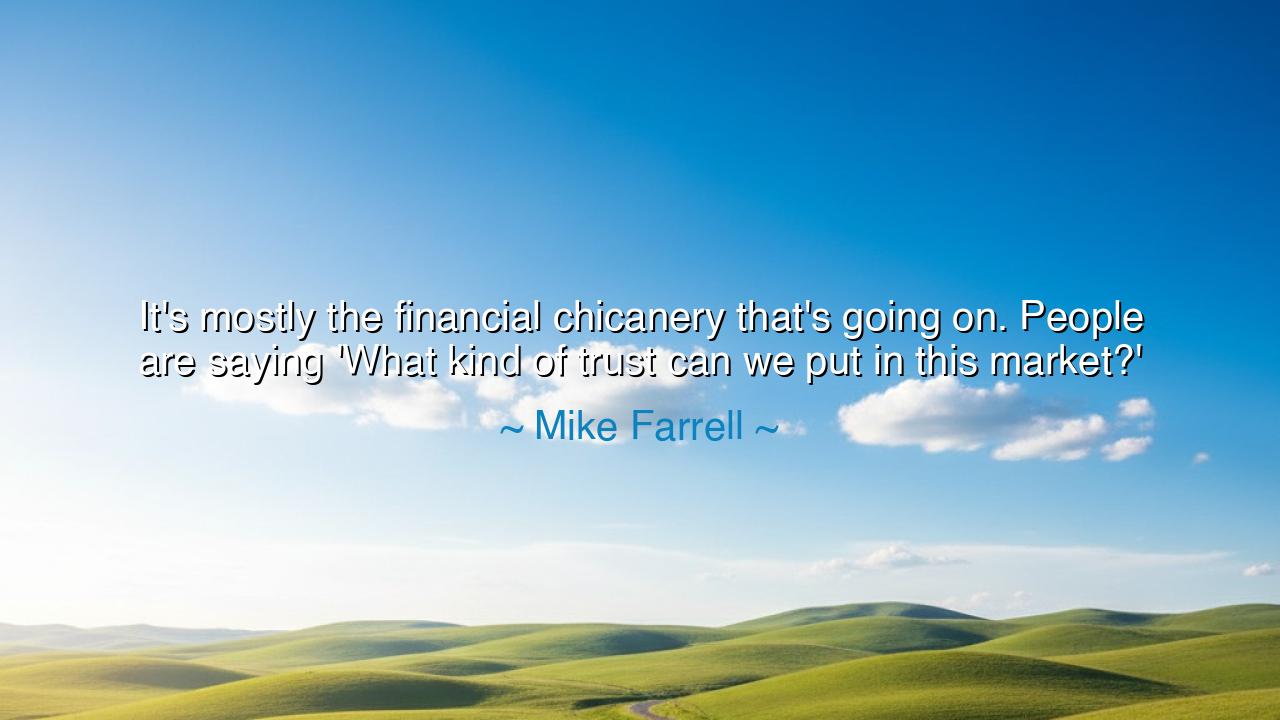
It's mostly the financial chicanery that's going on. People are
It's mostly the financial chicanery that's going on. People are saying 'What kind of trust can we put in this market?'






Hear the warning spoken by Mike Farrell: “It’s mostly the financial chicanery that’s going on. People are saying ‘What kind of trust can we put in this market?’” These words, though uttered in the modern tongue, resound with the weight of ages. They remind us that whenever deceit enters the chambers of trade, whenever men seek gain not through labor but through chicanery, the very foundation of wealth and order begins to crack. For a market, like a bridge, stands not upon stone alone, but upon the invisible strength of trust. Break that trust, and all who cross the bridge shall fall into ruin.
The meaning of the saying is clear: an economy cannot thrive where dishonesty rules. When schemes and manipulations replace honest exchange, when numbers are twisted and appearances dressed up to deceive, the people grow fearful. They ask, rightly: “What kind of trust remains?” Without faith that the market is fair, men and women hesitate to invest, to trade, to build—and so the market, drained of confidence, collapses under its own weight. Farrell speaks not merely of money, but of the sacred covenant between labor, trade, and truth.
The origin of such words lies in the turmoil of financial scandals, in times when the glitter of prosperity was revealed to be hollow. In America, the early 2000s saw great corporations fall—Enron, WorldCom—giants that once stood like colossi of commerce, but whose power was nothing but fraud disguised as fortune. Investors, workers, and families were betrayed, their lives upended by chicanery. Farrell’s lament rises from this soil of mistrust, echoing the cry of the people who had trusted in numbers that were lies.
History itself is filled with such warnings. In ancient Rome, when the coinage was debased—silver mixed with baser metals—the people lost faith in the empire’s money. Soldiers demanded payment in goods rather than coin, merchants turned suspicious, and the economy faltered. The empire that once stretched across the known world found its very arteries clogged by the poison of deception. Rome teaches the same truth as Farrell: without trust, even the strongest market weakens.
Consider too the Great Depression of 1929, when speculation, greed, and reckless schemes led to collapse. The crash was not only of markets but of faith. Families lost their savings, banks shuttered their doors, and the people cried out: “What trust can we put in this market?” Though decades apart, Farrell’s words echo their voices. When trust departs, fear takes its place, and fear suffocates the breath of commerce.
But Farrell’s teaching is not despair; it is a call to vigilance and reform. If trust is the lifeblood of markets, then integrity is the vessel that carries it. Leaders, traders, and ordinary citizens alike must guard honesty in their dealings. Regulation, oversight, and accountability are not chains upon commerce but the scaffolding that keeps it upright. And in the life of every individual, the same law applies: build your dealings upon truth, for falsehood may glitter for a moment, but it rots swiftly, leaving nothing behind.
Therefore, let this lesson be passed down: when you trade, trade in honesty. When you work, give your best. When you lead, be transparent. And when you encounter deceit, do not be silent, for silence feeds the leech of corruption. For markets may rise and fall, but the one who holds to truth shall always stand secure. And if society would prosper, let it remember Farrell’s cry: Without trust, there is no market; without integrity, there is no prosperity.






YLYen Lu
This comment feels eerily timeless. Every few years, there’s a new scandal that makes people ask the same question about trust. It makes me think that the issue might not just be bad actors but systemic flaws—structures that reward manipulation instead of integrity. What would it take to rebuild a financial culture grounded in honesty? Maybe it’s not about more regulation but about redefining what ethical success looks like.
PDdinh phuong dung
The phrase ‘financial chicanery’ sums up so much of what’s wrong with the modern market. From inflated valuations to shadow banking, there’s a sense that everything is built on half-truths. I wonder if technology, like blockchain or decentralized finance, could be part of the solution by making transactions more transparent. Or will human greed simply find new ways to exploit even those systems over time?
Llocle
It’s interesting how the quote points out that people are asking where to put their trust, not necessarily their money. That distinction says a lot. Maybe the financial system isn’t just about capital anymore—it’s about belief. When trust becomes the currency, manipulation of perception becomes the real crime. Can financial education or stricter oversight ever restore confidence once people start doubting the entire structure?
VT꧁༺Nguyen Van Tuan⁀ɪdol꧂
This statement makes me question the very foundation of modern finance. If trust is essential for any market to operate, what happens when that trust collapses? Does the economy reinvent itself, or does it just rebuild the illusion of credibility until the next crisis? It feels like we’ve been trapped in a cycle where short-term profit consistently outweighs long-term responsibility, and no one wants to break it.
Hhang
I completely relate to this sense of distrust. When ordinary investors see scandals, insider trading, or corporate bailouts, it’s difficult to believe the system is fair. What’s worse is that those who cause the damage rarely face real consequences. How can a market function on integrity when accountability is so selective? Maybe the real issue isn’t just financial chicanery—it’s moral bankruptcy disguised as business strategy.